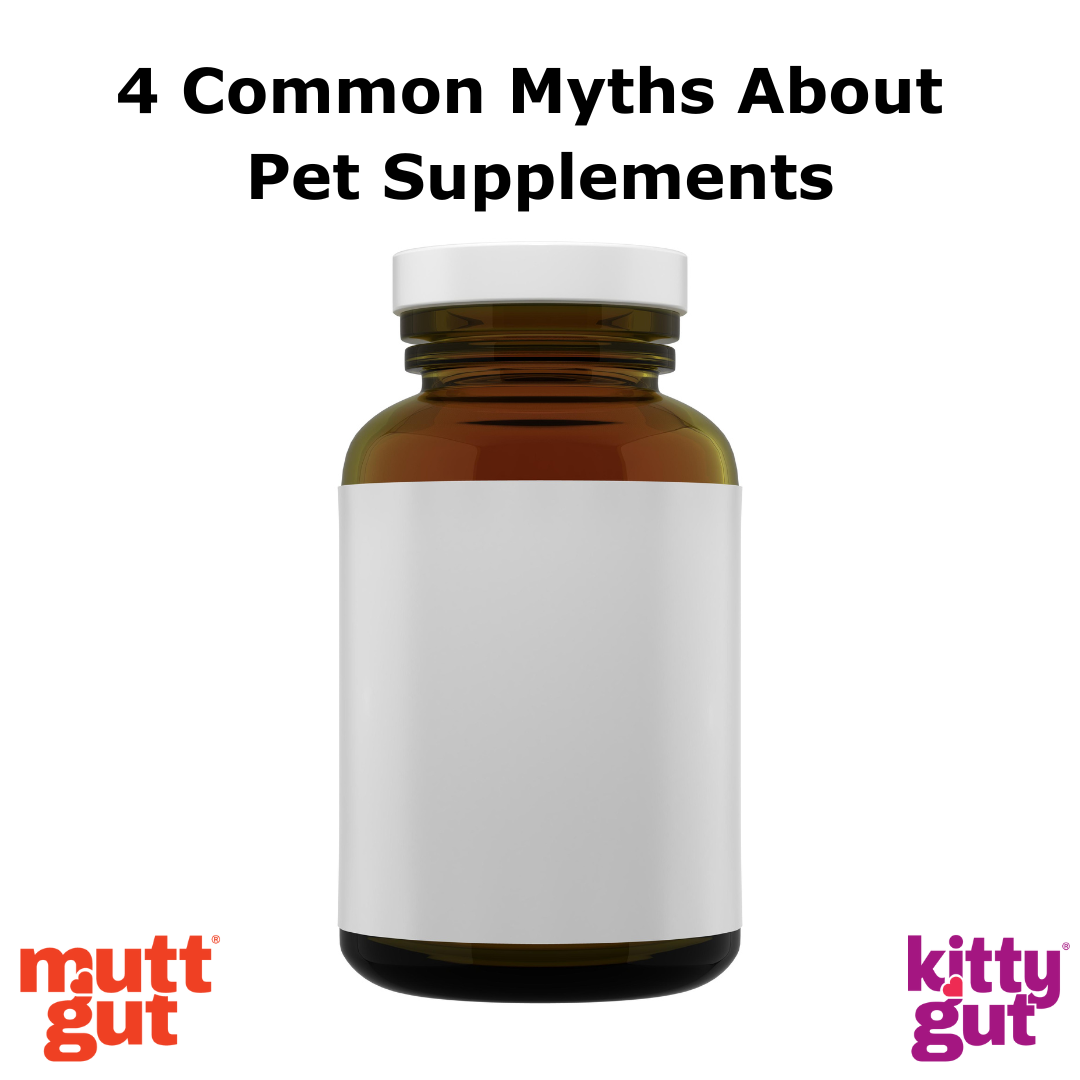
Exposing Common Myths About Pet Supplements
Share
Let's debunk common myths about pet supplements to clarify their safety, necessity, and effectiveness. In the world of pet care, misinformation can be confusing. We'll address four common myths and provide insights to shed light on the realities of pet supplementation.
Myth #1:

All Supplements are Safe and Effective
Many believe that all pet supplements are universally good. However, the pet supplement market offers diverse products of varying quality. Not every supplement is suitable for every pet, and factors like breed, size, age, and existing health conditions play a role in determining the appropriateness of a particular supplement.
To ensure safety and effectiveness, it's crucial to consult with a veterinarian. Vets can provide personalized recommendations based on a pet's individual needs and health history. This ensures responsible supplementation tailored to the unique requirements of each pet.
Understanding the specific purpose of each supplement is important. Supplements serve various functions, from promoting joint health to supporting the immune system or addressing skin and coat issues. Pet owners should educate themselves about their pet's needs to make informed decisions when selecting supplements.
Myth #2: Pets Can Get All Necessary Nutrients from Food Alone

Some believe that a balanced pet diet is enough for all nutritional needs. While high-quality pet food is essential, factors such as ingredient quality, processing methods, and individual pet needs can affect the nutritional content of commercial pet food.
The concept of "complete and balanced" pet food might not encompass optimal nutrient levels for every pet. Variations in a pet's metabolism, activity level, and health conditions may require adjustments to their nutritional intake.
Supplements play a crucial role in complementing a pet's diet by filling potential nutritional gaps. Pet owners must understand the specific nutritional needs associated with different life stages and breeds to ensure the right balance of nutrients for optimal health.
Consulting with a veterinarian is key to understanding a pet's nutritional requirements. Regular communication with a trusted veterinary professional ensures that a pet's nutritional needs are met throughout their life.
Myth #3: Supplements are Only for Sick or Older Pets

Contrary to the belief that supplements are only for sick or older pets, their benefits extend to pets of all ages and health statuses. While supplements can aid in managing health conditions and support aging, their role is not limited to remedial purposes.
Preventive care is a crucial aspect of responsible pet ownership. Supplements, when introduced early in a pet's life, contribute to long-term health and vitality. For instance, omega-3 fatty acids found in fish oil supplements can support joint health, improve coat condition, and promote cardiovascular health.
Approaching preventive supplementation with care is essential. Consulting with a veterinarian to tailor a supplement regimen based on a pet's individual needs, lifestyle, and potential risk factors ensures the effectiveness of preventive supplementation.
Myth #4: Natural Diets Don't Require Supplements

The popularity of natural and raw diets for pets has led to the misconception that such diets fulfill all nutritional requirements, eliminating the need for supplements. However, the nutritional composition of natural diets can be influenced by factors such as ingredient variations, sourcing, and preparation methods.
Thoughtful supplementation, based on a pet's specific requirements, can enhance the nutritional completeness of natural diets. For instance, calcium supplements may be necessary for pets fed homemade diets lacking sufficient bone content. Consulting with a veterinarian ensures that supplements are introduced judiciously, addressing specific nutritional needs without creating imbalances.
In our exploration of common myths surrounding pet supplements, we've emphasized the importance of informed decision-making in pet care. Dispelling these misconceptions empowers pet owners to navigate the world of supplements responsibly, prioritizing the health and well-being of their furry companions.
Remember, a one-size-fits-all approach does not apply to pet supplementation. Individualized care, guided by regular communication with a veterinarian, is essential for addressing the unique needs of each pet. Staying informed about pet nutrition and adopting a proactive stance towards preventive care contribute to a holistic approach to pet well-being.
As responsible pet owners, let's embrace the evolving landscape of pet care with open minds and hearts. By staying informed and prioritizing the health of our beloved pets, we ensure they lead happy, healthy lives by our sides.